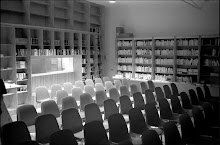by Jack McMartin, reporting from Villa Hellebosch, Vollezele
We are more than halfway through our time here at beautiful Villa Hellebosch, and, like a plot unfolding, storylines have begun to emerge. One such storyline: authority. Should the writer unabashedly embrace her authority and use it to be a moral beacon in society? Should she strive to cultivate an honest authority, or use her authority to expose its own weaknesses and ambiguities? Is writing with a certain authority inevitable? What of gendered authority? For our seven authors, the time to discuss (their own) authority is now.
Buzzword
If there is a buzzword for this gathering, it is: beacon. This, courtesy of Anne, who, on Day 1, called on her fellow writers to dare to find a more assertive voice. This meant asking important questions, but also suggesting important answers. “I am defending the novelist as a moral beacon. As authors, we should be more convinced that we can change the world.”
A lofty, thorny conviction, no doubt. But this challenge has found resonance among the group in interesting ways. The keynotes, readings and subsequent discussions over the past two days have explored this question from many angles.
Iman is skeptical. “Why should I play the role of the priest when I’m living in uncertain times, too? I don’t know anything for certain, and I’m hesitant of the word ‘moral’.”
Juan Gabriel points out that Latin American authors have an authority that carries with it both respect and politicality. This is an inevitable authority, and one that should be claimed by novelists if they – and not politicians – are to be the ones to write the narrative of their times.
Honesty
Jens Christian sees a departure from the writer as all-knowing (and thus capable of delivering moral prescriptions). For him, today’s writers are excavators of thorny authority. Writers do this by incorporating authorial problems in their stories, as a comment on the danger and deceit of an overly moralizing authorial voice. “I can only be a beacon without deceit. I try to write honestly.”
Joke affirms the importance of an honest, truthful authority. “Truthful implies that risk you take when taking a position of vulnerability, a new perspective, a sincerity, which is the counter to skepticism.”
Vulnerable
By the end of Day 2’s afternoon session, Anne seems to have backed off from her vulnerable position at the vanguard of writerly beacons. (Granted, she took on the role in the first place to generate discussion.) “I hear a lot of ambition in the group. We want to live forever and treat forever-contemporary stories. The more I hear this, the more I sink into the modesty of the author. It’s too much. My response is to go back to the simplest of simple stories.”
But this response is not a retreat, says Goce, invoking his concept of all-timeness. “Our stories are not going to last forever, but something should be so essential to existence in them that they communicate for all time. The simplest of simple stories can do that.” But how, asks Céline.
Maybe that’s the writer’s beacon. Maybe that’s the source of her authority.
Hear more tonight, when Céline, Joke, Iman, Jens Christian, Anne, Goce and Juan Gabriel open the writers’ circle they’ve nurtured here at Villa Hellebosch to the public – and the reader. Don’t miss “The Time of the Author” tonight at 8:15 pm at Flagey.
12/03/2014
Subscribe to:
Post Comments (Atom)

No comments:
Post a Comment